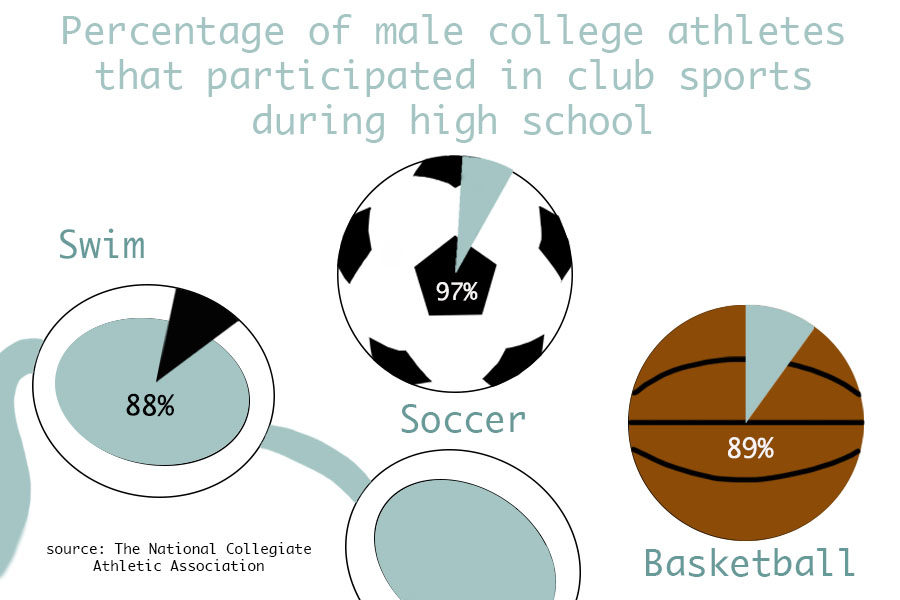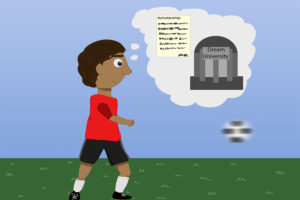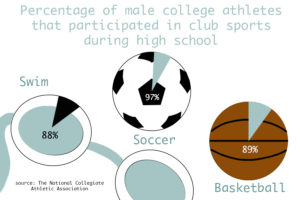Join the club
Playing out-of-school sports improves athletic ability, life skills
Club sports can provide more intense training, focus and experience for an athlete than high school sports. The Sidekick Co-Student Life Editor Sally Parampottil discusses why the majority of college athletes participated in club sports.
February 12, 2019
When it comes to athletics, improvement can be found in different areas – on and off the field, in and out of the pool, on and off the court, it varies from sport to sport. What does not vary, however, is that athletes can improve themselves in those areas more when they participate in club sports rather than sticking to high school teams.
People join club teams mainly because they allow for more improvement in the sport itself. With coaches who give more individual attention and a team atmosphere of competition, players can develop their skills to reach their maximum potential. Though the cost of joining may be higher, one gets more out of the program with more direct instruction from coaches, as well as a focus on strategy, individual performance and technique.
According to former Coppell High School girls soccer coach Chris Stricker, many high school players say they play for fun. Because people on school teams are generally playing with their friends, the overall team atmosphere could be more relaxed. In contrast, clubs are normally filled with players who specifically want to improve in the sport, producing a team with passion, talent and motivation.
Statistically, players who played for clubs during high school make up a higher percentage of college athletes in most sports, according to a 2015 study published by the National Collegiate Athletic Association (NCAA). By playing for a club, players are exposing themselves to college scouts more, which could eventually earn them scholarships. This could end up paying back the money spent to join the club teams.
Apart from the skills specific to sports, clubs offer the improvement of various life skills – for example, the ability to commit. Most club teams have year-round seasons, unlike most high school sports, which means players truly need to commit to the team and the sport.
Such commitment is exemplified in players like CHS senior Jeremy Basso, who plays center back for the Dallas Texans Soccer Club. This elite club, a member of U.S. Soccer Development Academy, has the policy that its players cannot play for any other team (apart from the national team). Basso, who played for the CHS soccer team from freshman to junior year, had to decide between his high school team and a club team.
“I joined [the Texans] mostly because of the competitive environment it provided,” Basso said. “It’s a team that practices year-round, and the level of play was really what attracted me there.”
The appeal of a club team is so large that a person could choose to move away from home to play for a club.
CHS senior Joe McGee moved to Coppell from San Antonio after freshman year to play for the elite soccer clubs in the area. He now plays for the Dallas Texans U19, alongside Basso and CHS senior Raul Carrillo, another athlete who moved away from his family to play for the club and now lives with McGee.
“I’ve been living away from my family for some time now, it’s my third year,” McGee said. “That pretty much just says how much club soccer offers. I would never move for a high school team.”
Like Basso, McGee has experienced a high school team.
“I played high school soccer in my freshman year,” McGee said. “I didn’t feel like I was improving or that I was getting anything out of it that I could get in [a club].”
Some may claim club teams do not have the same bond between players that a high school team provides. While it is true that the players do not all go to the same school, this serves as an opportunity for improving social skills.
It is important to know how to build relationships outside of school. The community and social webs in club sports broaden players’ horizons in terms of friend circles and prepare them for the next level of their sports: college.
“In college, you play with kids from around the country, not just the kids in the Dallas-Fort Worth area,” Basso said. “You get to see a lot of different play styles and personalities and types of soccer that you don’t necessarily get to see if you just play in your district.”
Club teams offer the chance for major improvements in multiple aspects of life – technical, social and life skills being some of them. They can take a good player and make them better until they can reach their absolute best.
Follow Sally (@sparampottil) on Twitter.











